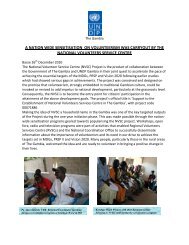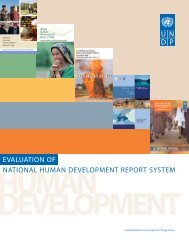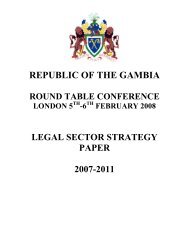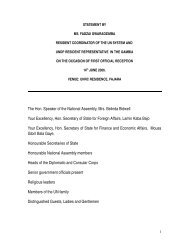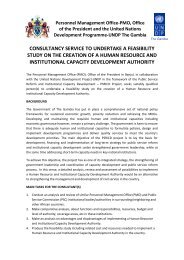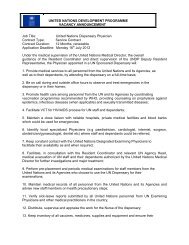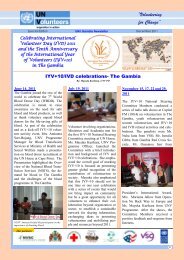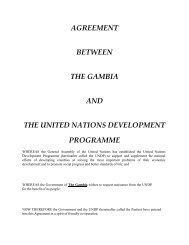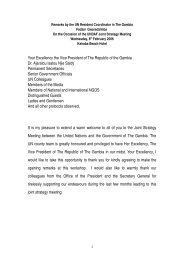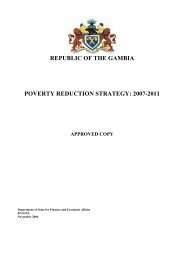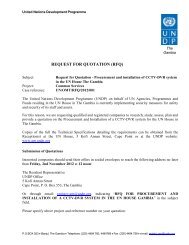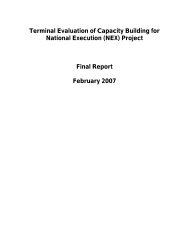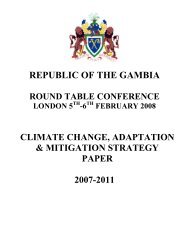Introduction - UNDP The Gambia
Introduction - UNDP The Gambia
Introduction - UNDP The Gambia
Create successful ePaper yourself
Turn your PDF publications into a flip-book with our unique Google optimized e-Paper software.
________________________________________________________________________________________________________________________<br />
A teleport project that is independent would<br />
pose competition to the national<br />
telecommunications provider, Gamtel, and if<br />
offers are more efficient and better serviceoriented<br />
than the national operator, it would<br />
attract its clients and pose a threat to the<br />
survival of the national telecommunications<br />
operator, especially if the teleport can supply<br />
services to the domestic market.<br />
Current thinking however is to operate the<br />
teleport through Gamtel, but this has the<br />
potential to discourage private sector<br />
participation, especially foreign investors<br />
who find public control or participation in<br />
private sector activities a high-risk venture.<br />
platform for institutionalised dialogue is the<br />
Annual Economic Summit, which serves as a<br />
forum for public/private/civil society<br />
dialogue. It is a formal consultative gathering<br />
where mechanisms for private sector growth<br />
and development are discussed.<br />
In addition to the Economic Summit, several<br />
initiatives have been undertaken, including a<br />
public-private consultative meeting on the<br />
economy, an interface policy dialogue<br />
workshop with civil society organisations, the<br />
private sector and the public sector and<br />
economic policy and policy analysis training<br />
workshops for private sector and civil society<br />
organisations.<br />
3.4.3 <strong>The</strong> <strong>Gambia</strong> Public/Private<br />
Sector Civil Society Interface<br />
Capacity Building Project<br />
<strong>The</strong> raison d’être for the establishment of<br />
GICAP as an interface institution is the<br />
realisation that the private sector and civil<br />
society are weak and incapable of effective<br />
participation in policy dialogue. <strong>The</strong>y also<br />
lack the capacity to influence the policy<br />
formulation and implementation processes of<br />
Government on a regular and continuous<br />
basis.<br />
<strong>The</strong> major capacity building components at<br />
GICAP are: institutional development,<br />
training, institutional networking and<br />
strengthening of the Information and<br />
Documentation Unit at DOSTIE. <strong>The</strong> project<br />
is funded by the ACBF and is designed to<br />
address the challenges faced by Government<br />
in instituting new approaches which require<br />
human and institutional strengthening,<br />
integration and networking within and<br />
between sectors, institutions and the citizenry<br />
equipped with the skills needed by the diverse<br />
economy. This project also includes capacity<br />
building at DOSTIE (by strengthening its<br />
policy analysis capacity) and promoting the<br />
interest of the private sector.<br />
GICAP therefore provides a consultative<br />
forum for the participation of the private<br />
sector and civil society in policy dialogue<br />
exercises. In addition to DOSTIE, the primary<br />
beneficiaries are the GCCI and TANGO. One<br />
<strong>The</strong> participation of the private sector in<br />
policy formulation:<br />
• instils a sense of ownership of national<br />
policies<br />
• helps to involve the private sector in<br />
research and advocacy<br />
• assists in promoting transparency and<br />
accountability, which are essential to<br />
good governance<br />
• allows programmes to accommodate the<br />
concerns and needs of the private sector<br />
• helps to identify constraints, limitations<br />
and hindrances to business growth and<br />
development.<br />
Since the establishment of GICAP, some 100<br />
senior private sector and NGO officials have<br />
attended training seminars on policy analysis.<br />
<strong>The</strong> project has provided equipment and<br />
training worth over D3 million to the GCCI<br />
as part of the institutional capacity building<br />
support for the private sector. It has also<br />
conducted seminars on international trade and<br />
accords such as AGOA, ECOWAS protocols<br />
and <strong>The</strong> <strong>Gambia</strong>’s responsibilities,<br />
opportunities and obligations as a member of<br />
the World Trade Organisation, to enable the<br />
private sector to avail itself of these<br />
opportunities.<br />
Although these capacity building initiatives<br />
will aid the growth and development of the<br />
private sector in some ways, it is doubtful<br />
whether they offer solutions to most of the<br />
constraints identified in this report.<br />
________________________________________________________________________________________________<br />
Building Capacity for the Attainment of the Millennium Development Goals in <strong>The</strong> <strong>Gambia</strong> National Human Development Report 2005<br />
37



